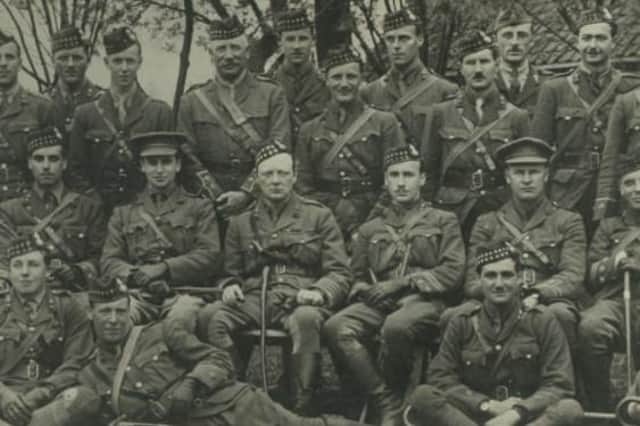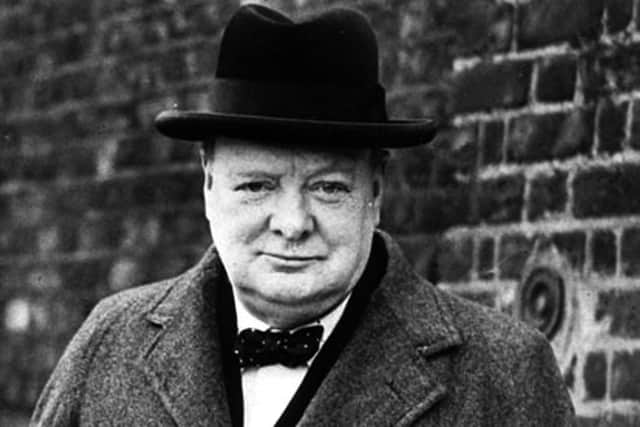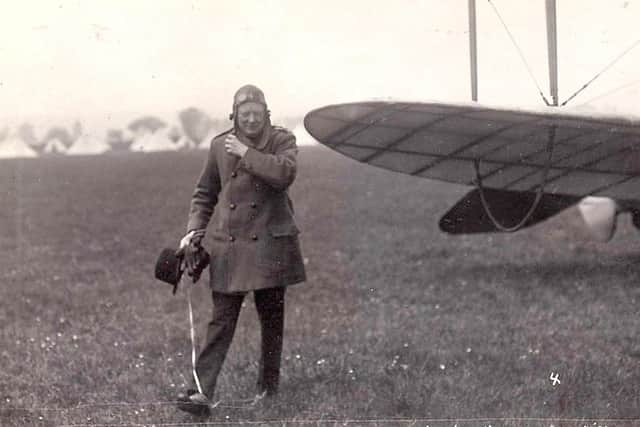Winston Churchill was close friends with a founder and leader of the SNP, Andrew Dewar Gibb, and supported Scottish home rule – Alastair Stewart


And why would you? The myth that Churchill hated Scotland is universal.
Yet there's scant evidence for the claim. Churchill did not order tanks to suppress strikers in the 'Battle of George Square' of 1919. That this fiction found its way into a Scottish history exam answer key – despite recent scholarship debunking the story – is telling.
Advertisement
Hide AdAdvertisement
Hide AdNo other figure is as unjustly maligned in Scotland as Churchill. His birthday even falls on St Andrew's Day to cement the irony. But the same Churchill also commanded the 6th (Service) Battalion of the Royal Scots Fusiliers in 1916 as a Lieutenant Colonel.
Serving as his adjutant was Major Andrew Dewar Gibb MBE QC, then a captain, who went on to become a founder and leader of the SNP (1936-40). He also served with Archibald Sinclair, another Scot, who went on to lead the Liberals (1935-45).
In 1924, Dewar Gibb released a book, published anonymously as Captain X, about his time with Churchill in the trenches. Re-released in 2016, titled With Winston Churchill at the Front, Winston in the Trenches 1916, it had a foreword by Randolph Churchill, Winston's great-grandson, and an introduction by Dewar Gibb's son, Nigel, now 88 and living in Glasgow.
It is Andrew Dewar Gibb who first records Churchill saying the three most important things he received from Scotland were his wife, his constituency, and his regiment.


Gibb concluded: “I am firmly convinced that no more popular officer ever commanded troops. As a soldier he [Churchill] was hard-working, persevering, and thorough. He is a man who is apparently always to have enemies.
“He made none in his old regiment, but left behind him there men who will always be his loyal partisans and admirers, and who are proud of having served in the Great War under the leadership of one who is beyond question a great man.”
In 2016, to mark the centenary of their family serving together, Randolph and Nigel went to Ploegsteert – or "Plugstreet" as the soldiers called it – near Ypres in Belgium.
Of their family association, Randolph said: "Whatever the political debates of today, they have no bearing on an objective view of history. My great-grandfather had a plethora of connections to Scotland, her politicians, her institutions, and her people. He was quite correct when he said he owed Scotland his wife, his constituency and his regiment."


Advertisement
Hide AdAdvertisement
Hide AdBoth men warn of Churchill falling out of Scottish public knowledge. Two plaques to his time in Dundee were erected in 2008, and there is a portrait of him by Sir James Guthrie in the Scottish National Portrait Gallery in Edinburgh. Otherwise, there are merely a handful of busts around the country including a miniature sculpture in Glasgow's Kelvingrove Museum.
Churchill was first elected Liberal MP for Dundee in 1908. In the same year, he married Clementine Hozier, a granddaughter of the tenth Earl of Airlie. He finally lost his seat to Edwin Scrymgeour in 1922 – Britain's first, and last, prohibitionist Member of Parliament (another irony, perhaps).
In 1912, Churchill was among the first senior British politicians to call for Scottish home rule and UK federalism. He had also received his first government appointment from Scottish Prime Minister Sir Henry Campbell-Bannerman in 1906. He was close friends with the former Prime Minister Lord Rosebery, a highly regarded Scottish politician in his time.
Churchill's four Scottish secretaries of state during the Second World War represented all of the major parties of the day. Scots like John Martin, Churchill's private secretary, helped him win it. He was even close friends with Harry Lauder. Churchill knew and understood Scots and to believe he didn't is foolishness.
In a speech in Edinburgh in 1950, Churchill warned that centralised socialism threatened the very being of the Union. Incredibly, he added: “If England became an absolute Socialist state… ruled only by politicians and their officials in the London offices, I personally cannot feel Scotland would be bound to accept such a dispensation.”
He continually acknowledged efforts to establish Scottish Home Rule. John MacCormick's Covenant for a Scottish Parliament achieved two-million signatures. James Stuart, as chairman of the Scottish Unionist Members of Parliament, responded: "If the people of Scotland were ultimately to decide in favour of a Scottish Parliament, no one could gainsay them."
As the leader of the opposition at the time, Churchill was unequivocal: "This letter expresses my own view, and there is nothing I can add to it."
Like every relationship, there is the sweet and the sour. But it's a hard thing to judge if social media is the go-to resource for half-remembered facts.
Advertisement
Hide AdAdvertisement
Hide AdDavid Freeman, Neil McLennan and I are among the first to collate and consider Churchill's Scottish connections. We've spearheaded the work of the International Churchill Society on the subject. Gordon Brown remarked of his predecessor that: "So much has been written about every aspect of Winston Churchill's life that it is surprising that one important area – his relationship with Scotland – has commanded so little attention."
As Nigel Dewar Gibb noted: "My father was very proud to have served with Churchill as his adjutant and prouder still of his country." Nationalism and unionism are hot debates today, but it's a cosmic error to view our history through that prism.
Andrew Dewar Gibb went on to become regius professor of law at Glasgow University from 1934 until 1958. He died on January 24, 1974 – nine years to the day after Churchill.
A message from the Editor:
Thank you for reading this article. We're more reliant on your support than ever as the shift in consumer habits brought about by coronavirus impacts our advertisers.
If you haven't already, please consider supporting our trusted, fact-checked journalism by taking out a digital subscription.
Comments
Want to join the conversation? Please or to comment on this article.
